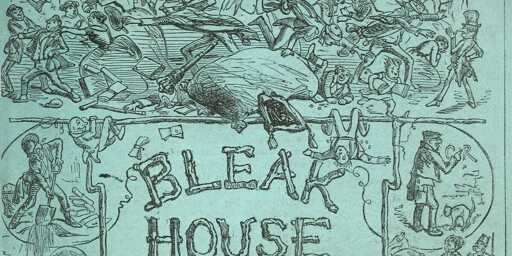Before I even read this article I just want to say that I read hundreds of pages of bleak house, but couldn’t finish it because I just thought it was really boring.
Edit: okay I’m reading the article now. I always liked the beginning of bleak house though. It’s depressing that so few people seemingly have the ability to enjoy it.
Spoiler alert, but I remember that there’s a character in this novel who proves he can read by writing a single word on a chalkboard, and then later in the novel he just randomly explodes, I think.
I feel like I’ve encountered this phenomenon enough times to discern a pattern but not enough to figure out what’s going on. The phenomenon is this: some medium blogger gets linked on here writing a fairly cohesive critique of Americans and I click on some of their other posts to discover their politics are a little off.
In this case I can’t tell you if Iron Council is tendentious and bad but I’m really wondering where the hell this brainwave is coming from:
What constitutes “right-wing art” — which is, by the way, labeling we’re grafting onto this thing after the fact, so it’s actually a very flimsy labeling, but what these pieces of work are doing is telling the truth about the world in a way that is not compromised by artistic or ideological preferences about how these events and these characters and these people, what society wishes were true about these people. My thing is that if you are telling the truth about the world, then you are going to make right-wing art. We don’t want to make the same mistake the left did by insisting that art satisfy our political priors. This will distort our creative undertakings in all sorts of ways that will reduce the quality of art and therefore reduce its cultural power (and therefore its political power). Instead, all a new cultural right has to do is tell the truth.
In conclusion, yes I think literacy and reading comprehension are in crisis but on the other hand the author of this blog is a weirdo.
Yeah the article just screamed “right-wing libertarian elitist who writes about how he’s so much smarter than the unwashed masses in order to make him feel better about his numerous social failures”. Interesting to see that my gut instinct on this wasn’t wrong.
Yeah his article about why married women should be more grateful about getting to do more housework is so dishonest. He’s criticizing a different substack article, insisting that his carefully selected quote isn’t leaving anything important out. He immediately just straight up lies about what’s in the rest of the article. Soon after, he cites one study, using two charts from it and conveniently neglecting to mention that the rest of the study he’s leaving out refutes his argument.
Can’t trust a conservative, folks!
Wow, that opening paragraph is setting off the “do not let this couple corner you at a party” klaxon.
My wife inhabits a corner of the internet almost entirely disjoint from my own, the woman part. I get youtube recommendations for wood working and speed runs, she sees makeup tips and fashion. Every site or app that’s even a little algorithmic shows this same basic pattern, keyed in part by our demographic data but more by our patterns of attention. This site is no exception, and she regularly sees and forwards essays to me that may as well come from another planet in terms of how far they are away from my algorithmic cluster. Sharing these gendered feeds with each other is a great source of topics for the never-ending conversation we’ve been having since the day we met.
political priors
 Rationalism brainworm spotted!
Rationalism brainworm spotted!This is why Heinlein was artistically correct to spend so much time in Starship Troopers ranting about how spanking kids is good, actually.
No political priors here, just pure, unvarnished da troof. And virtuoso musical styling to boot. Speaking of which, remember Toby Keith?
I found a YouTube link in your comment. Here are links to the same video on alternative frontends that protect your privacy:
This is the only piece of this author I’ve read and didn’t check anything else they wrote
I’m not blaming you or anything, I’m just kinda intrigued that it keeps happening.
I’ll be honest, I only read this article to make sure I was literate. Can report, I am one of the smarty pants who can read Bleak House. this system of measuring literacy by levels 1-5 seems most common in Britain, and the test was done on Americans at two Kansas universities. The Dicken’s passages seem to contain some culturally specific clues, though would the results be an different if they used Melville instead of Dickens? Maybe not.
Level 5 Literacy is basically the same, but across multiple sources at once while being critical: “Adults can search for, and integrate, information across multiple, dense texts; construct syntheses of similar and contrasting ideas or points of view; or evaluate evidence based arguments. Adults understand subtle, rhetorical cues and can make high-level inferences or use specialised background knowledge.”
I expect this competency to be demonstrated by a graduate with a Bachelor degree, this sort of literacy is equally important in STEM. I think my friends when I studied Engineering could do it, but I was friends with strivers, and I met a lot of idiots in random assigned group projects, and they graduated in the same class as me.
This explains a lot of the behavior of the lost libs that stumble in here like the guy yesterday demanding exhaustive sources and when provided with such simply said “I ain’t reading all that”.
More than 80% of Americans are functionally illiterate
to expand on this, according to PIAAC, 1 in 5 yankees cannot reliably answer questions of this level

I’m sorry what
Edit: How is this possible, I mean
And it’s by design. An Underground History of Education in America is an interesting book on the historical players involved. And guess who the main ones are (hint: it’s capitalists).
More than 80% of Americans are functionally illiterate
Westerners. Kanada isn’t any better. And “ai” is making it so much worse.
*Kkklanada
smdh even Hexbears are falling behind in their Maoist Standard English proficiency
SSorry, I need to read more booKKK$.
in that guy’s case imo it was more psychological shutdown than a reading issue.
can you summarize this post, it’s too long for me
other people dum
Thanks @grok
deleted by creator
It was really muddy
So muddy it makes you think of dinosaurs.
I’m a good writer.
Specifically, being muddy makes you think of dinosaurs because scientists of your time hadn’t figured out plate tectonics yet so your idea of the history of the earth was a weird mix of early paleontology and bible stories.
It was also super foggy. Like in that movie The Fog.
There was fog in so many places. You don’t even know.
Dickens feels like an odd choice to display functional illiteracy, given that while it’s technically written in modern English it’s also marred with the cultural baggage of Victorian England; “wonderful,” for example, is meant in this passage to mean that it produces awe or astonishment, but that’s not how the word is used by anyone in modern times. The dinosaur portion is part of a larger metaphor using Noah’s Ark which is only really going to pop to someone with decent familiarity with Christian mythology, and worded in a way that still takes someone literate a moment to digest and understand it.
I’m not entirely sure the form of the study helps either; most of the responses seem like they threw a passage at an undergrad and immediately demanded their interpretation in a clinical (read: atypical and somewhat uncomfortable compared to normal reading) setting. How many of the readers would have re-parsed the passage given another moment or two and understood it? Furthermore, the opening passage isn’t even particularly important to the plot, and it seems like the vast majority of people reading understood at the very least that “it was a shitty morning in London” is the point here. Is that functional illiteracy, or simply skimming purple prose that isn’t all the relevant to the story?
This example feels only a little removed from laughing at undergrads for not understanding why Homer spent so goddamn long in the Iliad charting random Greek soldiers’ entire family trees only to kill them off a breath afterwards, and calling them illiterate for not grasping cultural context from literal antiquity.
I read the linked study, they weren’t testing for immediate comprehension, but rather what tools a reader will utilize and how much effort they were willing to put in before giving up. The testees had access to the internet to look up phrases and titles that they didn’t understand, and as far as I can tell there was no time limit. The “problematic” group included people who thought that there was meant to be a literal dinosaur walking around in the mud, and like half of the people in it never figured out that the setting was a court of chancery.
I figured the dinosaur thing was meant to allude to primordial or primitive imagery, but I wouldn’t have guessed it had to do with something like noah’s ark
“The waters” is still a common way among Christian nerds to refer to the deluge, i.e. God’s most famous genocide. But only among the worst nerds.
deleted by creator
The whole point of the test is that you’re supposed to be able to parse these meanings anyway. It’s supposed to be relatively challenging.
At what point does the test become “do you have very specific historical knowledge that is functionally trivia for any real world use case?” though?
They don’t need to have the knowledge memorized. They had full access to google and a dictionary to look up anything they found confusing, and couldn’t even do that. The test was of their ability to figure out a somewhat difficult text, not of their historical knowledge.
I didn’t clock that they had Google access when reading through it earlier, I thought they were limited purely to a dictionary/encyclopedia lookup. That does make it a little more damning.
That’s just what high literacy - which is expected of English majors, especially by their third and fourth year - requires.
According to ACT, Inc., this level of literacy translates to a 33–36 score on the Reading Comprehension section of the ACT (Reading).
In 2015, incoming freshmen from both universities had an average ACT Reading score of 22.4 out of a possible 36 points, above the national ACT Reading score of 21.4 for that same year.
A third of senior and junior English majors were found to be completely helpless! That is not acceptable!
Honestly, doing any amount of reading will put you a solid 50% ahead of literally anyone in any industry. I am in computers and I genuinely think that most computer science majors didn’t do any of the reading whatsoever. It’s becoming abundantly more clear as I’m going back for my masters that of my class of say 20 maybe seven actually read part of our required reading.
Not shocking for a country where education isn’t exactly prioritized.
Like this subject, most of the problematic readers were not concerned if their literal translations of Bleak House were not coherent, so obvious logical errors never seemed to affect them. In fact, none of the readers in this category ever questioned their own interpretations of figures of speech, no matter how irrational the results.
This is the more troubling bit than not recognizing archaic English (I get why the one kid assumed Michaelmas was a name). Not being able to recognize that one has presented a contradictory argument speaks to a severe deficit in reasoning. I’m not sure if that’s a failure of education or a reflection of a society that presents introspection and self-criticism as weakness.
However, I do want to push back a little on this:
In the end, the lesson is clear: if we teachers in the university ignore our students’ actual reading levels, we run the risk of passing out diplomas to students who have not mastered reading complex texts and who, as a result, might find that their literacy skills prevent them from achieving their professional goals and personal dreams.
This begs the question, what are the professional goals that are stymied by not being able to deconstruct Dickensian prose? Is this something that major publishing houses care about when hiring people? If these kids are able to graduate and then go on to have successful careers despite being below what’s considered “standard,” is it possible that the standard is simply irrelevant to “real world” demands? That these kids are simply prioritizing what their “professional goals” demand rather than being incompetent?
With your last point, I think there is a massive disconnect between how the university views its purpose, and what the society the students graduate into actually is. Of course the major publishers don’t care if you can deconstruct Dickens, they pay millions of dollars for trite ghost written crap because it sells.
Arguably if you are an English major, you should leave with the ability to read dense texts, including archaic ones, but I don’t really blame the students for seeing that it doesn’t really matter because society at large does not care and they will graduate whether they can parse Dickens or not.
This all just results in a less literate society though, and I think that’s a net negative overall.
I mean, yeah it would be a more literate society if most English majors could parse Dickens. But I don’t know if it’s less literate than back when most people didn’t even touch a college-level English course.
I get why the one kid assumed Michaelmas was a name
Just to force Hexbears to learn what it is, Michaelmas is the festival of Saint Michael on September 29th, and thus Michaelmas Term refers to a (university) fall semester.
If your professional goals are becoming an English professor (which is what most English professors assume an English major should want), then this is definitely a barrier.
Otherwise, eh. I think colleges have become too vocationally focused and everyone’s trying to put a dollar value on being able to understand and interpret the human condition in way that goes beyond Fascism’s bland and flattened take on the concrete and coming up empty, and then trying to figure out how to dress up what they’re doing as important to The Machinery so they can keep getting their grant money.
There’s a cognitive dissonance where academia can’t decide if it’s for white collar vocational training or for intellectual pursuit to further society and individuals. So we end up with this sort of half baked of one, not quite there of the other situation.
And then in reality it’s neither, it’s a bunch of people drawing faulty conclusions from bad data.
Ngl the dinosaur bit tripped me up until I recalled wonderful could be indicative of astonishment (USain reporting for duty!
 ) then everything clicked and flowed pretty seamlessly.
) then everything clicked and flowed pretty seamlessly.I don’t know how none of the people in the excerpts picked up that it wasn’t literally about a dinosaur in the street (or the fact they only recognized it was an animal and not a dinosaur, even when I had no fucking clue what it was meant to imply I still understood it was figurative. The fact none of them realized it was setting a scene was even more asinine. I felt illiterate reading this fact I needed a dictionary for some of the terms was disappointing (I read too much low-effort fantasy slop), and think the bar for “competent” was far too low.
I took some English in college and none of it really required older texts though so I could see how it could be overwhelming. Frankly, I am mildly concerned that I wouldn’t have been able to parse it if not for the fact I studied philosophy and their prose is so much worse (in the difficulty and often in the enjoyability as well). Thinking of my fellow
 friends, I have I believe 2 that would probably be able to read this competently though most of my friends from other countries I know definitely could parse this, including many that learned English in their late teens.
friends, I have I believe 2 that would probably be able to read this competently though most of my friends from other countries I know definitely could parse this, including many that learned English in their late teens.I’m young too, so this means I likely had the same or worse literary education as everyone interviewed, the only difference would be my major and the fact I do read for leisure (or as a hobby for the gamers in the chat). (Edit: I also know a bit of a second language and can read texts in it but my proficiency is still low so I am used to strain while reading, maybe there is an acclimation effect there?)
You mean all the xianxia novels aren’t going to help my understanding of Marxist theory?

Fellow Daoist, do not let this Heart Demon prevent you from following the Great Dao, lest you suffer qi deviation.
Idk why but its funny to me that you posted this after an english major shot up some Israeli ambassadors
I don’t think this is new. I once encountered on an online political debate forum a guy who was constantly misspelling things and couldn’t (wouldn’t?) understand metaphors, hyperbole, or analogies. Someone would use a word like “proliferate” and he would assume it meant “pro-life.”
He revealed later he had graduated with a degree in English after topics around literature came up. This was over a decade ago and Spark’s Notes helped many people scoot by. Not surprising colleges are becoming diploma mills since so many of them always have been.
Sadly believable.
no metaphor left behind
Other than the first sentence of the first passage (“Michaelmas term lately over, and the Lord Chancellor sitting in Lincoln’s Inn Hall.”) these were not particularly difficult to understand. A bit verbose, but generally quite clear.
I’m not surprised that university students struggle with this though because the difficulty level and expectations for reading have fallen through the floor. Most students don’t read anymore, and I assume many just use chatgpt to summarize at this point. Reading is a lot like working out a muscle and if you don’t keep it up it atrophies.
I feel like it’s easy to blame social media, and I know it’s melted my own brain, but I don’t think students are challenged to read enough at any level of education anymore and aren’t helped enough to learn how to parse difficult texts. Class sizes continuously growing and funding being cut definitely doesn’t help. It’s hard to imagine a different outcome under the logic of neoliberalism.
I feel like it’s easy to blame social media…I don’t think students are challenged to read enough at any level of education
Yeah like I said earlier in the thread, I don’t think this is anything new. I remember being in middle school over 20 years ago and tons of kids didn’t read. People were blaming video games and MTV. A lot of it had to do with kids being made to read books they weren’t interested in, so they couldn’t read denser material, either.
Neoliberalism is focused on churning out a workforce using as few resources as possible. It’s not interested in making educated human beings.
I’m sorry but this article really rubs me the wrong way. The example used (the intro to Bleak House by Charles Dickens) doesn’t seem like it would have a whole lot of cultural relevance to the sample of students tested who were from public colleges in Kansas. If you’re the kind of person who already reads Dickens and/or watches British period dramas like Downton Abbey, you’ll probably perform much better in this exercise, but that doesn’t necessarily mean you are functionally illiterate or lack reading comprehension skills in a general sense. If the reading sample in question was something like Trainspotting, would it mean that Scottish readers have a unique talent for reading that others don’t have? Of course not. It just means the others aren’t Scottish.
A better example imo would have been something more universally difficult, like… A Clockwork Orange or Finnegan’s Wake, but in reality it’s hard to remove cultural bias completely. Or… You know what? Fuck it. Everyone should just be forced to read Hegel and be considered illiterate unless they can completely understand each and every sentence. How does that sound?
Everyone should just be forced to read Hegel and be considered illiterate unless they can completely understand each and every sentence. How does that sound?
Based
Not everything you read is supposed to be easy! That’s the point of the test! If you’re majoring in fucking English, you should still be able to read a moderately difficult and archaic text if you have full access to your phone and a dictionary, regardless of how “culturally relevant” it is.
Everyone should just be forced to read Hegel and be considered illiterate unless they can completely understand each and every sentence. How does that sound?
Yes, communists should strive to build a society where the average person is able to comprehend complex philosophical prose! Turn the esoteric exoteric!























